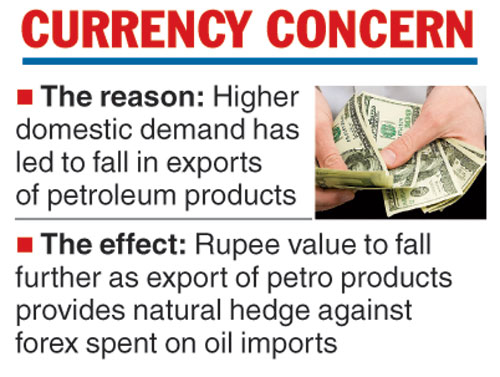Exports of petroleum products have fallen because of a higher domestic demand, which could have an impact on the country’s trade deficit and rupee value.
Petroleum products account for over a tenth of the gross value of outbound shipments, analysts said.
The exports had decreased 24.3 per cent during January 2019 and 8.6 per cent during April 2018-January 2019 over the corresponding period of the previous year, latest government data showed.
Analysts said if the current trend continued, it would further weaken the rupee as oil product exports act as a natural hedge against dollar-denominated oil imports.
“The export of petroleum products provide a natural hedge against imports of oil and the forex spent on imports of oil. Therefore, if exports slow down, then the natural hedge to that extent is lower. It will have an impact on our trade deficit, plus there will be pressures on our currency because your dollar demand will be more,” analysts said.
The recent strengthening of the rupee, they said, should be seen in the overall context. The Indian currency generally gains in March and this time it is due to the inflow by foreign portfolio investors into the stock market which has pushed the currency to a nine-month high.

The Telegraph
“A turnaround in political sentiments, FPI flows along with the expected large inflows from rights issues and the merger and acquisition deals, reduced geo-political tensions, stabilisation in oil prices have driven the rupee appreciation to a nine-month high,” Ganesh Kumar Gupta, president of Fieo, said adding the rupee could stay strong as the flows continue.
The decline in oil product exports comes at a time oil imports have been rising steadily as the country meets a higher percentage of its total domestic demand from the overseas markets.
At the same time, domestic production of crude oil has declined 4.7 per cent and of natural gas by 2.9 per cent since 2014-15 despite consumption increasing at a healthy annual rate, according to the latest government data.

